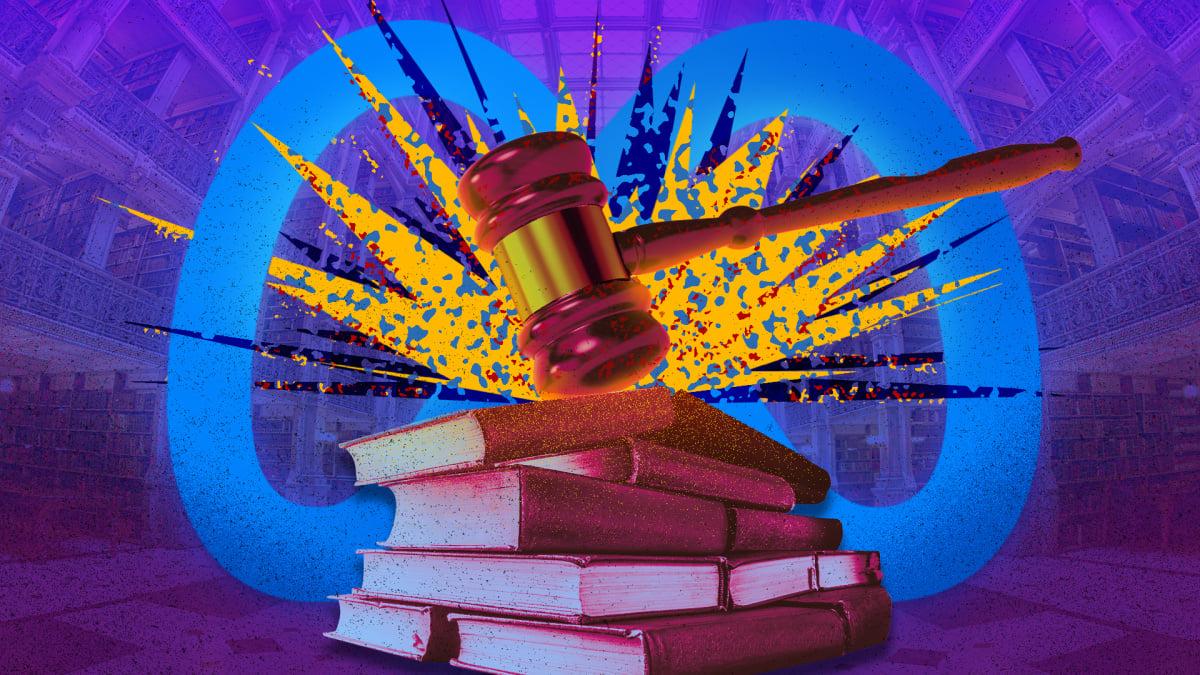Meta just won a major ruling in a landmark case about how copyright law and fair use applies to AI model training, the second such loss for authors this week. Just days ago, Anthropic won a fair use case as well.
Late Wednesday afternoon, U.S. District Judge for the Northern District of California Vince Chhabria denied the plaintiffs' motion for partial summary judgment. At issue in the case: whether Meta's use of pirated books to train its Llama AI models violated copyright law. In the case, Richard Kadrey, et al. v. Meta Platforms Inc., authors including Richard Kadrey, Sarah Silverman, Ta-Nehisi Coates, and Junot Diaz accused Meta of copyright infringement.
In the discovery phase of the case, internal Meta messages revealed that the company used pirated datasets with copies of 7.5 million pirated books and 81 million research papers, according to The Atlantic's LibGen investigation.
What may seem like a blatant theft for profit in the eyes of the authors is actually a much more complex deliberation in copyright law. It's undisputed that Meta torrented terabytes of pirated books, but its lawyers successfully defended this act under the fair use doctrine, which allows the use of copyrighted works in certain contexts. Kadrey v. Meta is one of dozens of copyright lawsuits against AI companies making their way through the U.S. court system. At the heart of these fights is a battle of values: the rights and livelihoods of artists versus technological innovation at all costs.
How the authors lost their fair use argument
Of the four fair use factors, the case mostly hinged on factor one, whether the use is transformative, and factor four, whether the use harms the existing or future market for the copyrighted work. Meta clinched factor one. "There is no serious question that Meta’s use of the plaintiffs’ books had a 'further purpose' and 'different character' than the books—that it was highly transformative," said Chhabria in his ruling. Relatedly, Anthropic won a fair use case on Tuesday, with U.S. District Judge William Alsup deeming its Claude models transformative.
So the bulk of the deliberation came down to the fourth factor, or market harms. Chhabria said the plaintiffs failed to successfully argue that Meta caused market harm, for example, by regurgitating verbatim excerpts of books, robbing authors of AI licensing deals, or diluting the market with AI-generated copycats.
"Meta has defeated the plaintiffs’ half-hearted argument that its copying causes or threatens significant market harm," said Chhabria. "That conclusion may be in significant tension with reality, but it’s dictated by the choice the plaintiffs made... while failing to present meaningful evidence on the effect of training LLMs like Llama with their books on the market for [AI-generated] books."
Mashable Light Speed
Chhabria's decision was forecasted during the oral arguments held on May 1. The judge grilled lead plaintiff counsel David Boies about his team's shortcomings in presenting the market harm argument. "Whether it's in the summary judgment record or not, it seems like you're asking me to speculate that the market for Sarah Silverman's memoir will be affected by the billions of things that Llama will ultimately be capable of producing," said Chhabria "and it's just not obvious to me that that's the case."
Chhabria even pushed Boies to argue more strongly for market harms, saying, "you lose if you can't show that the market for the copyrighted works that are being used to train the models are dramatically impacted."
Almost two months later, Chhabria made this decision final.
"We appreciate today’s decision from the Court," said a Meta spokesperson about the ruling. "Open-source AI models are powering transformative innovations, productivity and creativity for individuals and companies, and fair use of copyright material is a vital legal framework for building this transformative technology."
The copyright battle against AI companies will continue
The ruling does contain some good news for authors and artists, just not for the 13 authors involved in this case. Judge Chhabria emphasized that his decision isn't a precedent that applies to all such cases.
This Tweet is currently unavailable. It might be loading or has been removed.
This Tweet is currently unavailable. It might be loading or has been removed.
Chhabria explained in his ruling that his decision was less about the fair use defense of using pirated books to train AI models and more about the shortcomings of the plaintiffs' argument. "The Court had no choice but to grant summary judgment to Meta," said the judge, before adding:
"This is not a class action, so the ruling only affects the rights of these thirteen authors—not the countless others whose works Meta used to train its models. And, as should now be clear, this ruling does not stand for the proposition that Meta’s use of copyrighted materials to train its language models is lawful. It stands only for the proposition that these plaintiffs made the wrong arguments and failed to develop a record in support of the right one."
Chhabria also said he believed "it will be illegal to copy copyright-protected works to train generative AI models without permission." On a possibly related note, this May, the U.S. Copyright Office released a pre-publication version of a highly anticipated report on copyright law and AI. The report concluded that training AI models on copyrighted works without permission is likely not fair use. However, the report came out days before President Donald Trump fired the head of the Copyright Office, so it’s unclear what impact this preliminary report could have on future cases.
Meta's fair use ruling is certainly a setback for authors and other creatives. But as Chhabria signaled, the fight is far from over.
Disclosure: Ziff Davis, Mashable’s parent company, in April filed a lawsuit against OpenAI, alleging it infringed Ziff Davis copyrights in training and operating its AI systems.






